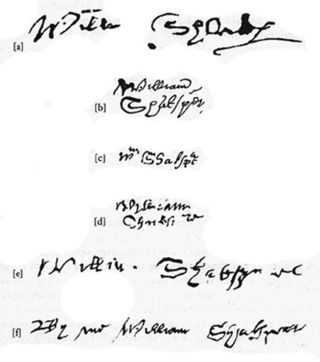Groupthink
Group Think and Academia: Shocking Shakespeare Shenanigans
Why is authorship important? What does new research reveal about Shakespeare?
Posted March 9, 2016
In 1962, William H. Whyte, Jr. coined the term "groupthink," "a rationalized conformity" that maintains "group values" are "right and good," "guided almost totally by the whims and prejudices of the group," resulting in increasingly subservient Americans who "embrace groupthink as the road to security." In 1972, social psychologist Irving Janis researched and expanded the concept of groupthink to refer to a group sense of cohesiveness that not only "overrides realistic appraisal of alternative courses of action" but also dehumanizes other groups.(p.433).
In 2009, Daniel Klein pointed out that academia is not immune to groupthink: "...standards for performance are not separate from support for specific beliefs"—"positions on how performance should be umpired or evaluated and one's support for a certain "team" are not separable." Klein observes that tenure track professors create "departmental majoriartarianism" He quotes studies revealing that refining ideas ties precedence over re-examing prior decisions. Scholars are less likely to respond to colleagues whose work threatens their own. As if this is not enough, further studies reveal that most academics rarely revise their view-point after the age of twenty-five or thirty. Conformism gradually produces ideological uniformity.
We have developed an academic system that is highly vulnerable to groupthink. Academic disagreements become polemical because disagreement with accepted academic thought threatens the entire academic hierarchy. By starting with a given set of premises, reasoning becomes circular, deductive rather than inductive, making an unbiased conclusion problematic. Progress, however, depends on academic analysis free from self-interest.
What are the ramifications of groupthink? Not surprisingly, there is a long list of discoveries that were ignored because they contradicted accepted academic theories. If an outsider makes the discovery, it requires even more time to be accepted. The work of Gregor Mendel, an Augustinian monk, the father of genetics, was criticized and basically ignored until after his death. Francis Peyton Reus’ work on the transmission of cancer by a virus was ignored for years because he was an M.D., not a physiologist. Geologists denied Alfred Wegener’s theory of continental drift until after his death. Subrahmanyan Chandrasekhar’s theory on Black Holes was so denigrated he was forced to leave England. Crick and Watson were ordered to stop their research on DNA. The implications of repressive groupthink are painfully evident in hindsight.
An academic debate that has become extremely contentious is the Shakespeare authorship question. Questioners are condemned as “ignoble,” (1) “bonkers,” (2) “conspiracy theorists,” (3) even “holocaust deniers,” (4)— examples of the dehumanization of the other in groupthink that Janis described in the 70s. Off the record, a professor acknowledged that addressing the authorship question is “academic suicide.”
Indeed, why would anyone question who wrote the works of Shakespeare? In a nutshell, this is what I discovered and why this dispute breathes new life into Shakespeare studies.
1) What About All the Biographies? Since hundreds of biographies have been written about Shakspere of Stratford, how could there be any doubts? In The Truth about William Shakespeare, 2012, the traditional, Stratfordian academic, David Ellis takes his fellow Stratfordians to task for writing biographies on assumptions and flights of fancy. He chides biographers for using subjunctive and conditional tenses and for lapsing into the indicative when points are speculative. Ellis concludes that it is impossible to write a biography of Shakspere of Stratford because there are not enough facts.
In 1909, Mark Twain came to the same conclusion about Shakespeare biographies, “…watered by guesses, and surmises, and maybe-so’s, and might-have-beens, (…) and the rest of that ton of plaster of Paris out of which the biographers have built the colossal brontosaur which goes by the Stratford actor’s name.”
What a lot of historical fiction we have out there masquerading as biography. Who knew?
As Diana Price points out, early researchers assumed that every time the name Shaksper(e) or any of its variant spellings appeared in the records, the name referred to the same person. Hence we have references to the author Shakespeare, the actor, and the merchant with multiple variant spellings. Were all three the same person? That is the ongoing assumption. As a frame of reference, Price notes that scholars know that there were four different contemporaries named Christopher Marlowe—three in addition to the playwright.
2) The Paper Trail—Diana Price studied every major Elizabethan author. All had contemporary “paper trails”—manuscripts in their own hand, letters; books signed by them, references to personal interactions with them by contemporaries, records of payment or patronage, etc. Shakespeare, “the soul of the age,” was the only major author for whom there was not one contemporary written document linking him with any sort of literary activity.
Price did find a large number of contemporary hand-written documents concerning Shakspere— almost 70, but all of them were for business dealings—buying land, property, theater holdings, acting, loans, and lawsuits, including one against him for hoarding grain during famine, and his will. Only six bear his signature. Scholars have now found so may records for his business activities that we know they interfered with the presentation of the plays at court, and some Strafordians now wonder how he found time to write.

3) The Signatures— The only handwriting we have from Shakspere of Stratford are 6 signatures, all on legal documents. All of them are scrawled, twice with the aid of a clerk to fill in his first name. They all spelled differently—and never spelled Shakespeare. Numeracy, not literacy, was all that was needed to conduct business in Elizabethan England. Only seven of the nineteen elected officials in Stratford could sign their names when Shakspere’s father held office. Shakspere’s parents and his children were illiterate.
Until the 20th century, Stratfordians used the name Shakspere—the name the man from Stratford used when signing his name. Although he spelled his name different ways, the man from Stratford never signed his name Shakespeare. Stratfordians now use the name Shakespeare because that is the name on the plays and the sonnets.
4) The Will— In his three page last will and testament, Shakspere makes no mention of any books, manuscripts, plays, correspondence—or to anything else of a literary nature, not even to a family bible. There are no references to anything or any person of a theatrical nature: between the lines, in a different ink and handwriting, someone later added money to buy rings for three actors associated with Shakspere. Dr. Hall kept a detailed record of his own book collection as well as references to prominent patients, but he makes no mention of any books or manuscripts inherited from Shakspere, his father-in-law. Neither Dr. Hall nor Shakspere’s daughters ever refer to Shakspere as a writer.
5) The Stratford Monument— The Stratford monument has long stood as proof that Shakspere of Stratford wrote the works, but an original drawing from 1616 and later records detailing “upgrades” to the monument make clear the monument we see today was altered several times. The original monument depicted Shakspere holding a bag of grain.
6) Intimate Knowledge of Italy— All Shakespeare scholars agreed Shakspere of Stratford never left England, until detailed knowledge of Italy in the plays has now necessitated speculation that Shakspere “may have” traveled to Italy or “may have known” someone who had been to Italy.
In The Shakespeare Guide to Italy (Harper Perennial, 333pp.), Richard Roe researches the incredibly detailed knowledge of Italy exhibited in the plays. Descriptions once assumed to be errors actually represent lost knowledge. The plays allude to everything from inland canals filled in long ago, family names associated with specific cities, descriptions of buildings and streets in different cities that still stand today (e.g. Shylock’s house), unusually scheduled masses, the location of Prospero’s island, dialects, etc.
7) Erudition—Despite detailed knowledge of the law, literature, astronomy, philosophy, art, music, military and maritime terminology, medicine, horticulture, falconry, and tennis, traditional academics maintain the plays do not suggest an advanced education. Records for the grammar school in Stratford are lost, and there is no record Shakspere attended university.
As it has become abundantly clear Shakespeare had expertise in many different fields, traditional academics now assert that associates helped in the writing of the plays. To save Shakspere of Stratford as author, his plays are now being considered the work of a kind of collaborative authorial factory with different writers contributing different parts of the plays. New stylistic analyses of the plays to identify different authors’ possible contributions have proven difficult and contradictory. Whereas we have the paper records for collaborations for many authors, we have nothing to indicate any sort of collaboration between Shakespeare and other authors.
8) Immunity from Imprisonment—Elizabethan England was a dangerous place for writers. Lord Burghley, Queen Elizabeth’s Secretary of State, did not hesitate to imprison, torture, exile, or chop off hands and ears, if a piece of writing was deemed subversive. Ben Jonson, Thomas Kyd, and Christopher Marlowe were all arrested. Shakespeare parodied Lord Burghley on stage as Polonius in Hamlet—a point Stratfordians made, but now reject. In describing Richard II, which played an important role in the Essex uprising, Queen Elizabeth said, “I am Richard II, know ye not that?” Yet, Shakespeare was never censored or imprisoned. How did Shakspere escape condemnation for such libelous and seditious plays when other playwrights suffered grievously for much lesser infractions?
9) The Scandalous Sonnets—In 1640 offending pronouns in the sonnets were changed as well as the sequencing; and titles were provided. There is a dangerous whiff of homoeroticism in the sonnets, even for an age of intense male friendships.
It is assumed that Shakspere wrote the sonnets for the Earl of Southampton; but the sonnets were published with the hyphenated name Shake-speare. Would Shakspere, a commoner, have risked putting his name to highly erotic poems addressed to a nobleman, in an age in which class distinctions were assiduously maintained and homosexuality was punishable by death and forfeiture of all assets?
10) Renaissance Anonymity and Pseudonymity—In her study of The Anonymous Renaissance, Marcy North points out there were at least 800 anonymous authors during this period—not counting pseudonymous authors. Authors had very good reasons for avoiding identification by government authorities. In addition, there is the social disapprobation associated with writing for theaters, which were located outside the city of London because of their association with houses of ill repute and bear baiting. As a point of comparison, Molière, often called the French Shakespeare, was a pseudonym. Molière used a nom de plume to protect his family name Poquelin.
11) Why does authorship matter? The authorship debate has breathed new life into Shakespeare studies. Oxfordian scholarship (which advocates for the Earl of Oxford as the author) has helped to reveal Shakespeare’s exceptional knowledge and brings new depth and meaning to the works—e.g., his knowledge of the law and Italy. An overlapping of Shakespeare’s works and de Vere’s life provides startling parallels that are not easily dismissed. These parallels reverberate with profound psychological and political dimensions—“the absent self” that has troubled scholars for so long.
The wealth of new scholarship has forced Stratfordians to revise their understanding of Shakespeare as much more complex than previously thought. Other authors have also been suggested—e.g. Christopher Marlow and Francis Bacon—which means that we are acquiring a much more sophisticated knowledge of Elizabethan England, its history, and literature.
It is not acceptable for academics to label those who question the traditional authorship as “lunatics,” “conspiracy theorists,” or worse when the traditional theory for Shakspere is built upon historical fictions and suppositions that are presented as facts. Differing points-of-view must be allowed the same playing field. These academic slurs illustrate Janis’ observation about demonizing “the other.” Shakespere academics who resort to name calling and censorship simply reveal the weakness of their position. We need free academic discussion.
12) Support Academic Freedom—If you think that the authorship question is fair—that it is okay to ask who wrote the works, to speculate, to inquire, to enrich your understanding of the history and the personages of the era—then, please, sign The Declaration of Reasonable Doubt (https://doubtaboutwill.org/declaration) that simply states it’s okay to ask the question. You will be in the company of many great minds—e.g., Mark Twain, Ralph Waldo Emerson, Walt Whitman, Henry James, Charlie Chaplin, Derek Jacobi, Roland Emmerich, and Justice Sandra Day O’Connor, to name a few. Right now, it’s not okay to ask—it’s “academic suicide” spiced with accusations of “lunacy” or worse; and non-Strafordian academic work is censored by mainstream academic publications
Endnotes:
1) "ignoble"—Stanley Wells,:She (Diana Price) knows a great deal; it’s just a great shame that her knowledge is put to such ignoble ends. The anti-Shakespeareans are not necessarily ignorant people, some of them know a great deal.”
shakespeare-authorship.com: Shakespere’s Unorthodox Biography
2) “bonkers,” “lunatics”—
Stanley Wells, "Shakespeare Beyond Doubt": “We’re not just talking about people [Oxfordians] who are bonkers or intellectually challenged. We’re talking about people whose ideas are insidiuous, reactonary and dangerous.” <http://interestingliterature.com/2013/07/28/guest-blog-shakespeare-beyo…; ; A.J Hartley, "What Time Devours," p. 62, "Those lunatics who claim that the Earl of Oxford wrote the plays”,p.62, . Google Oxfordian and lunatic to find as many examples as you like.
2)"Conspiracy theorists"
The BBC often refers to the Oxford theory as a conspiracy theory—"conspiracy" is used four times in the following BBC website: <http://news.bbc.co.uk/local/oxford/hi/people_and_places/history/newsid_…;. The Wikipedia article on De Vere says Oxfordians promote a “conspiracy theory.” For more examples, just google Oxfordian and conspiracy theory to find as many as you like:e.g. https://en.wikipedia.org/wiki/Oxfordian_theory_of_Shakespeare_authorship
4) "holocaust deniers"- Stephen Greenblatt apologized for his comparison of Oxfordians to holocust deniiers, “I very much regret my Holocaust example..." http://oberonshakespearestudygroup.blogspot.com/2014/04/greenblatt-sez-…




